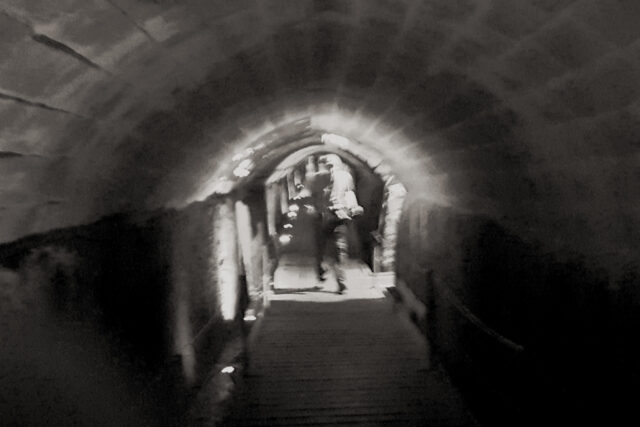Ben Corvo
More than 40 years ago, my father, whose yahrzeit falls on Tu Be-Av, visited the ghats in Varanasi, where bodies are burned, bone fragments sifted out, and the ashes poured into the Ganges. I imagine him there with his camera—lift, point, shoot, again and again—among the pilgrims, the mourners, and the dying. Although he is a fairly skilled photographer, as a pyre ignites right next to him with a furious whoosh he is startled, and forgets to advance the film.
I do not know what really happened. All that I know is the outcome, or part of it, two images superimposed in a single frame, the one of the pyre, the other the shape of a man, or the shadow of a man, now seeming to whirl skyward in the flames, like the angel in haftarat Naso (Shoftim 13:20), or (as I imagine it) the flight of a soul suddenly cut free.
My father liked his images clean, uncluttered. He did not like this one. In all likelihood, he threw it out. In his last years, I do not think that he remembered it at all. But who knows, maybe I am wrong. Maybe the serendipity, Jungian synchronicity, or hashgahah peratit that brought the two images together—and from beyond the photograph’s frame, unintelligible voices, smoke, the smell of burning fat, the tiredness of his own body, his sheer disorientation—underlay in some deep-down sense his latter-day wish to be cremated, and the family’s later obedience to that wish, against all dictates of Halakhah and custom.
I was not there when it happened. I am not sure if anyone in the family was. His body was kept in an industrial facility in suburban Atlanta for a few days while paperwork was sorted out and, when the time came, was shunted (smoothly, soundlessly) into the furnace and reduced to powder, with not a fragment to be sifted out. I do not know what was done with the ashes or where they are.
Perhaps a belated protest can be forgiven: don’t let them win, them being a long line running from the midrashic Nimrod (Eruvin 53a) through the people who (during my father’s own childhood) presumably burned remnants of his mother’s extended family in Poland. The smokes following or not following his mother to industrial Chicago, where her immediate family has immigrated, and into the family house. The rattle of lungs taking them in or not taking them in. His mother is dying of cancer, the disease that will take him decades later. He is kept home when she is buried. Nothing is ever said.
I would like to think that both stories are true—on the one hand, bureaucratic process, self-cancellation, sublimation of bodies and the histories they carry; on the other, a riverbank, a moment of horror and amazement, perhaps almost immediately forgotten, but working, working underground, and (perhaps unrecognized) someday finding an unlikely light. In a photographic frame, both the flames whirling skyward and the shape of a man, the shadow of a man.
Here is another framework—a photograph, a poem. A street in Jerusalem, the most domesticated of streets; we could almost mistake it for suburban Atlanta, but for the stories that remain there, the stories that are brought there. In the shul there, the men meeting thrice daily for prayers, the syllables they string together, the stories they bring to light. Trees, night camps, crows winging heavily across a fading sky. A sudden flare from distant ghats.
One evening, two old friends meet as if by chance there, outside, afterward. A small shock of mutual recognition passes between them. They cannot say what or why.
The Meeting
Always the same blue opalescence
in the sky as the men spill into the street
after prayers, its mere presence
filling evening air. The men meet
in little clusters of two or three and walk
a short distance together, or greet
each other in passing. Their murmured talk
is at one with the wind in high branches
of the eucalyptus, the muted calls
of last solitary crows straggling across
skylight to night-rookery. Your own
murmured prayer, too, bits and pieces
of words rising a little, then settling
like flotsam in tide, or smoke from watchfires
of goatherds or harvesters, once, in this season,
at this time. Everything is tender
now and hangs in balance, constellations’
wheel above, watchfires below, prayer,
men gathering at evening,
here on the street outside or in outer
edge of firelight. Seen
from above, the men are
tiny flecks in uncanny eyes of goats,
or at harvesttime, black scatter
of olives around each tree. The crows
fly out each morning, return each evening,
they settle in clusters or call out
to each other in passing or warning,
evading the men in the camps, picking at
flotsam, windfall, gleanings,
anything that
is not quite nothing, your own murmured
fragments, smoke whirling from ghats,
watchfires, harvesttime, carrion birds
flapping heavily, it is evening,
prayers are over, you are walking homeward
in blue opalescence of day’s end,
where we meet, as if by chance, old friend.





![Yom Yerushalayim: On Not Yet, Always Already, and the [Im]possibility of Crossing Over](https://thelehrhaus.com/wp-content/uploads/2025/05/The_Kotel_23908738216-238x178.jpg)




 Site Operations and Technology by The Berman Consulting Group.
Site Operations and Technology by The Berman Consulting Group.